I am for peace; but when I speak, they are for war!
(Psalms 120:7)
 As I’ve been convalescing from my spinal fusion surgery, I have a lot of down time, and am just beginning to feel well enough to feel the need to do things to occupy my time. I listened in my first week home to THE HOBBIT on my Kindle text to voice reader. It is not a human reading the text, but a mechanical reader, which takes some getting used to. Nevertheless, I was thankful for having a device that could read to me while I lay flat listening. I read THE HOBBIT 35 years or more ago, and although I remember liking the book, I found that I really didn’t remember the story at all.
As I’ve been convalescing from my spinal fusion surgery, I have a lot of down time, and am just beginning to feel well enough to feel the need to do things to occupy my time. I listened in my first week home to THE HOBBIT on my Kindle text to voice reader. It is not a human reading the text, but a mechanical reader, which takes some getting used to. Nevertheless, I was thankful for having a device that could read to me while I lay flat listening. I read THE HOBBIT 35 years or more ago, and although I remember liking the book, I found that I really didn’t remember the story at all.
 As in the entire LORD OF THE RINGS TRILOGY, I do remember having an emotional reaction to the role war plays in the writings of Tolkien. He was not an idealist, like I am. He did not envision a world without war or without evil or without a struggle between good and evil. That struggle takes place not only on the macro level of all people on earth, but in the heart of each individual as well.
As in the entire LORD OF THE RINGS TRILOGY, I do remember having an emotional reaction to the role war plays in the writings of Tolkien. He was not an idealist, like I am. He did not envision a world without war or without evil or without a struggle between good and evil. That struggle takes place not only on the macro level of all people on earth, but in the heart of each individual as well.
I remember being troubled when I first read his trilogy by Tolkien’s realism regarding war and the almost necessary role it has in history. On this earth there is and will be struggle, and there are forces that are trying to prevail over the rest of inhabitants of earth. Tolkien does accept the grand epic notion of a cosmic struggle between good and evil, and yet in my reading of him, he is not blaming Satan for the existence of war, struggle or evil on earth. Evil lurks in the hearts of earth’s inhabitants. Satan is not much needed to cause war when the inhabitants of the earth are so ready to use violence to attain even unimportant goals.
 There is always someone or some group which desires to have power over others and is willing to do anything to gain and maintain their position of power. There always are some who are willing to enslave others to attain their goals. Evil and wickedness are in this sense forces that can work upon our hearts and minds, and it happens at every level of human existence from the individual up to entire cultures and empires.
There is always someone or some group which desires to have power over others and is willing to do anything to gain and maintain their position of power. There always are some who are willing to enslave others to attain their goals. Evil and wickedness are in this sense forces that can work upon our hearts and minds, and it happens at every level of human existence from the individual up to entire cultures and empires.
“The LORD saw that the wickedness of man was great in the earth, and that every imagination of the thoughts of his heart was only evil continually. And the LORD was sorry that he had made man on the earth, and it grieved him to his heart.” (Genesis 6:5-6)
I appreciate that recognition of what lurks in the hearts of earth’s inhabitants in the writings of JRR Tolkien. The struggle with evil that we each and always face is not just the fault of Satan, but it is a true spiritual warfare in each of us. Sometimes it becomes a collective when an entire nation embraces evil design and decides it is OK to oppression or destroy their fellow inhabitants on earth.
I wish it weren’t so, and by nature am a pacifist, but I realize Tolkien is right about the nature of evil in the world’s population as he is correct about war as a means for people to achieve their goals or to oppose those who want to oppress.
Even after the Great Flood: “the LORD said in his heart, ‘I will never again curse the ground because of man, for the imagination of man’s heart is evil from his youth…'” (Genesis 8:21)
 My pacifistic beliefs are not the result of personal holiness, but the result of wishful idealism. Would that we on this planet could find it in our hearts not to hate others, not to be ready to kill those different from us, not to be willing to enslave those we think as lesser than ourselves, not to rely on violence to attain our wishes and goals. But, alas, as in the world Tolkien created, violence and war seem to be part of the fabric which makes up our hearts.
My pacifistic beliefs are not the result of personal holiness, but the result of wishful idealism. Would that we on this planet could find it in our hearts not to hate others, not to be ready to kill those different from us, not to be willing to enslave those we think as lesser than ourselves, not to rely on violence to attain our wishes and goals. But, alas, as in the world Tolkien created, violence and war seem to be part of the fabric which makes up our hearts.
Jesus said: “For from within, out of the heart of man, come evil thoughts, fornication, theft, murder, adultery, coveting, wickedness, deceit, licentiousness, envy, slander, pride, foolishness. All these evil things come from within, and they defile a man.” (Mark 7:21-23)
So the quote of the little Hobbit, Bilbo Baggins, stood out in my mind as I listened to the tale:
“You are a fool, Bilbo Baggins, and you made a great mess of that business with the stone; and there was a battle, in spite of all your efforts to buy peace and quiet, but I suppose you can hardly be blamed for that.” (Kindle 4368-69)
Like Bilbo, I wish people could get along on planet earth, and I’m so often dismayed by as he was by the stubbornness and lack of good will even among some who are supposed to be allies. How quickly we so often resort to violence and how willingly we go to war. maybe it is Tolkien’s realism, or maybe it is the biblical notion of violence and evil which lurks in the hearts of every human being.
I know I have used these quotes several times in other blogs, to make the same point, but I came back to the same ideas while reading Tolkien.
 “Gradually it was disclosed to me that the line separating good and evil passes not through states, nor between classes, nor between political parties either — but right through every human heart — and through all human hearts. This line shifts. Inside us, it oscillates with the years. And even within hearts overwhelmed by evil, one small bridgehead of good is retained. And even in the best of all hearts, there remains … an unuprooted small corner of evil.
“Gradually it was disclosed to me that the line separating good and evil passes not through states, nor between classes, nor between political parties either — but right through every human heart — and through all human hearts. This line shifts. Inside us, it oscillates with the years. And even within hearts overwhelmed by evil, one small bridgehead of good is retained. And even in the best of all hearts, there remains … an unuprooted small corner of evil.
Since then I have come to understand the truth of all the religions of the world: They struggle with the evil inside a human being (inside every human being). It is impossible to expel evil from the world in its entirety, but it is possible to constrict it within each person.” (Aleksandr I. Solzhenitsyn, The Gulag Archipelago 1918-1956)



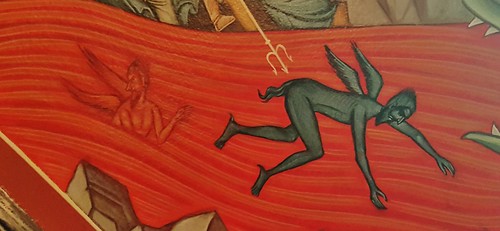
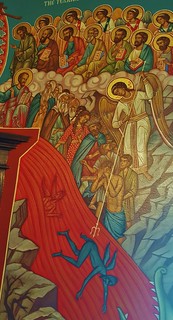

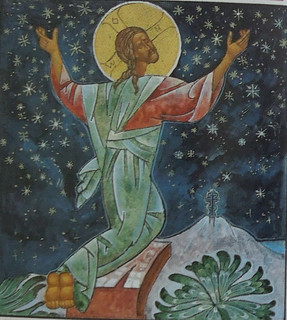

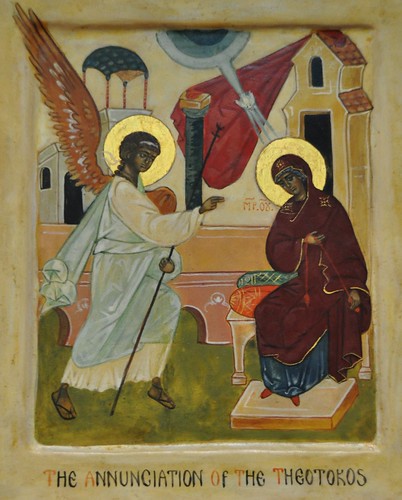


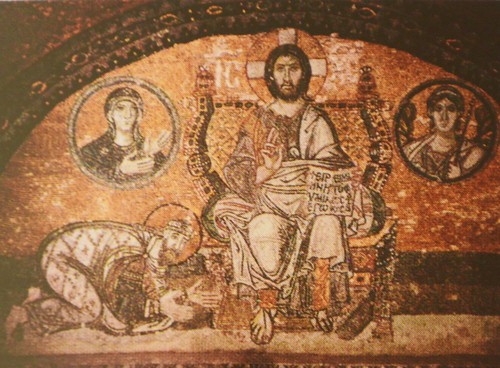
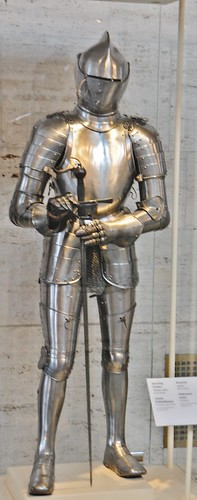














 There is always someone or some group which desires to have power over others and is willing to do anything to gain and maintain their position of power. There always are some who are willing to enslave others to attain their goals. Evil and wickedness are in this sense forces that can work upon our hearts and minds, and it happens at every level of human existence from the individual up to entire cultures and empires.
There is always someone or some group which desires to have power over others and is willing to do anything to gain and maintain their position of power. There always are some who are willing to enslave others to attain their goals. Evil and wickedness are in this sense forces that can work upon our hearts and minds, and it happens at every level of human existence from the individual up to entire cultures and empires. My pacifistic beliefs are not the result of personal holiness, but the result of wishful idealism. Would that we on this planet could find it in our hearts not to hate others, not to be ready to kill those different from us, not to be willing to enslave those we think as lesser than ourselves, not to rely on violence to attain our wishes and goals. But, alas, as in the world Tolkien created, violence and war seem to be part of the fabric which makes up our hearts.
My pacifistic beliefs are not the result of personal holiness, but the result of wishful idealism. Would that we on this planet could find it in our hearts not to hate others, not to be ready to kill those different from us, not to be willing to enslave those we think as lesser than ourselves, not to rely on violence to attain our wishes and goals. But, alas, as in the world Tolkien created, violence and war seem to be part of the fabric which makes up our hearts. “Gradually it was disclosed to me that the line separating good and evil passes not through states, nor between classes, nor between political parties either — but right through every human heart — and through all human hearts. This line shifts. Inside us, it oscillates with the years. And even within hearts overwhelmed by evil, one small bridgehead of good is retained. And even in the best of all hearts, there remains … an unuprooted small corner of evil.
“Gradually it was disclosed to me that the line separating good and evil passes not through states, nor between classes, nor between political parties either — but right through every human heart — and through all human hearts. This line shifts. Inside us, it oscillates with the years. And even within hearts overwhelmed by evil, one small bridgehead of good is retained. And even in the best of all hearts, there remains … an unuprooted small corner of evil. There is a debate among some Christians that the Lord’s Prayer should conclude with the words “deliver us from the Evil One” rather than the customary “deliver us from evil.” The prayer thus asks God the Father not merely to protect us from generic evil but really from the works of Satan.
There is a debate among some Christians that the Lord’s Prayer should conclude with the words “deliver us from the Evil One” rather than the customary “deliver us from evil.” The prayer thus asks God the Father not merely to protect us from generic evil but really from the works of Satan. St. Ephrem has Satan call the many passions (like anger and envy) of a person “satans” but really is acknowleding these passions are not demons but things residing within each human. Jesus speaks about this same idea in Mark 7:21-23 where He notes that evil lurks in the heart of each human but He does not blame the Evil One.
St. Ephrem has Satan call the many passions (like anger and envy) of a person “satans” but really is acknowleding these passions are not demons but things residing within each human. Jesus speaks about this same idea in Mark 7:21-23 where He notes that evil lurks in the heart of each human but He does not blame the Evil One.
 Satan deserves no blame for the passions and behaviors in which a human chooses to engage. People blame devils for their faults rather than do the hard work of dealing with their destructive passions.
Satan deserves no blame for the passions and behaviors in which a human chooses to engage. People blame devils for their faults rather than do the hard work of dealing with their destructive passions. Recently I read some email comments about the power of evil in the world. The comments implied that it was because of evil on earth that God sent His Son into the world, and that the death of Christ on the cross was also the result of evil. Thus, the way the story was being presented it was the existence of evil that caused the incarnation.
Recently I read some email comments about the power of evil in the world. The comments implied that it was because of evil on earth that God sent His Son into the world, and that the death of Christ on the cross was also the result of evil. Thus, the way the story was being presented it was the existence of evil that caused the incarnation. The true motivation of the God who is love is clear in the writings of certain saints of the Church.
The true motivation of the God who is love is clear in the writings of certain saints of the Church. 
 Sin and death therefore are either that which separates us from God and which must be overcome by the incarnation, death and resurrection of Christ (a view common in the Christian East), OR sin and death are the very conditions necessary in order for God to be our Savior and thus can be said to cause salvation. A number of the Eastern Patristic Saints were convinced that love alone was what caused God to act on our behalf – in the incarnation and in the crucifixion. Evil is not the cause of God’s plan of salvation, rather God’s love destroys evil in all of its manifestations including sin and death. Evil does not cause God to act. The God who is love acts according to His own nature to overcome evil. Love conquers all.
Sin and death therefore are either that which separates us from God and which must be overcome by the incarnation, death and resurrection of Christ (a view common in the Christian East), OR sin and death are the very conditions necessary in order for God to be our Savior and thus can be said to cause salvation. A number of the Eastern Patristic Saints were convinced that love alone was what caused God to act on our behalf – in the incarnation and in the crucifixion. Evil is not the cause of God’s plan of salvation, rather God’s love destroys evil in all of its manifestations including sin and death. Evil does not cause God to act. The God who is love acts according to His own nature to overcome evil. Love conquers all.